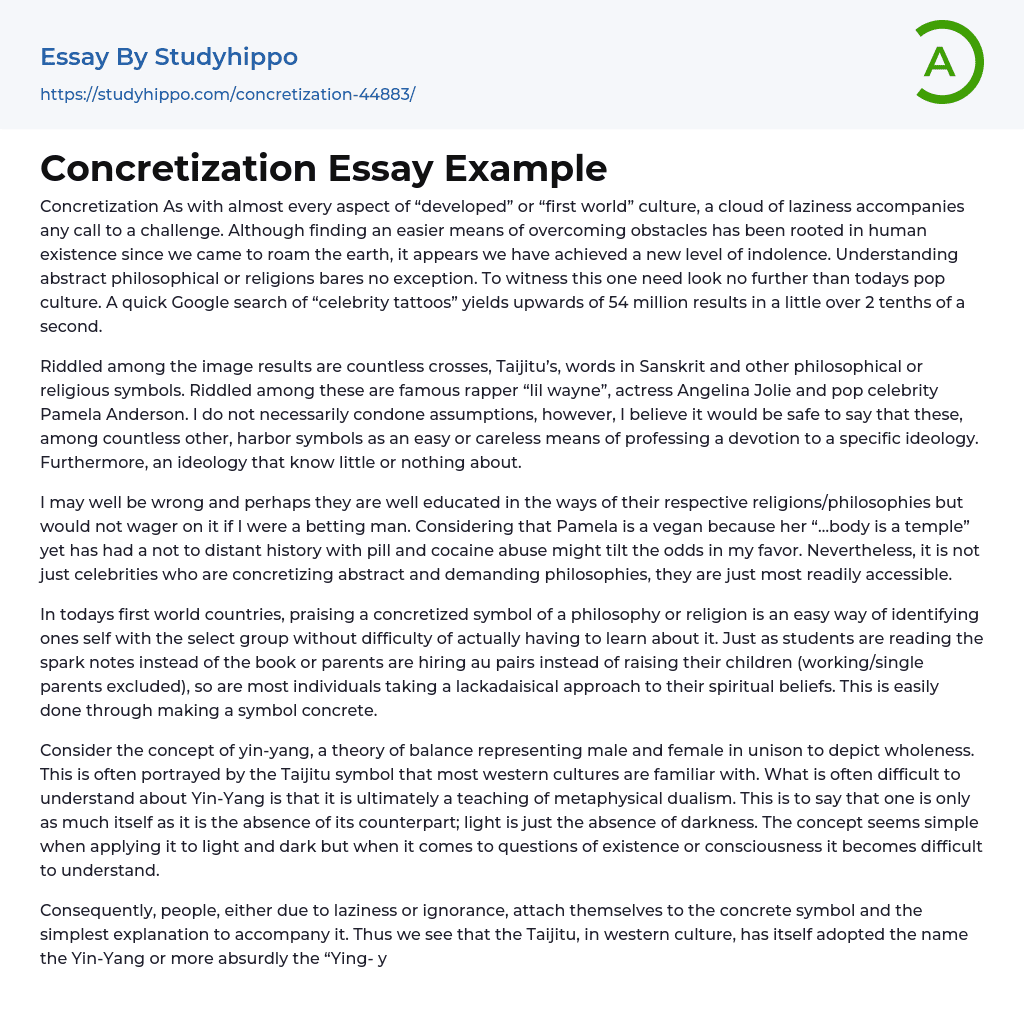Modern culture exhibits concretization in various ways. The link between laziness and the pursuit of convenience and ease is a prevalent characteristic seen in "developed" or "first world" societies. This inclination can be observed in our approach to overcoming challenges, which has been deeply rooted in human existence since the beginning. However, it appears that we have now reached an unprecedented level of indolence. This trend becomes particularly evident when considering our comprehension of abstract philosophical or religious ideas. One only needs to examine popular culture as evidence of this phenomenon. A straightforward Google search for "celebrity tattoos" produces over 54 million results within seconds.
The image results display a variety of symbols, including crosses, Taijitu symbols, and Sanskrit words. These symbols represent philosophical or religious ideas. Alongside these symbols are famous figures like
...rapper "lil wayne," actress Angelina Jolie, and pop celebrity Pamela Anderson. It can be inferred that these individuals, among others, use symbols to express their affiliation with a particular ideology. However, it is probable that they possess limited knowledge or understanding of this ideology.
It is possible that individuals who follow certain religions or philosophies may lack knowledge in those areas. I am unsure about this claim, but Pamela, a vegan, values the purity of her body. However, her past struggles with addiction to pills and cocaine could support my perspective. Nonetheless, it is important to recognize that celebrities are not the sole proponents of intricate and demanding belief systems; they are just the most readily available examples.
In contemporary developed nations, expressing admiration for a symbol representing a belief system or religion is a convenient means o
aligning oneself with a particular group without the need to fully comprehend it. Similar to students opting for spark notes instead of reading the entire book or parents hiring au pairs instead of raising their children (excluding those who are employed or single parents), many people are adopting an apathetic attitude towards their spiritual convictions. This can be achieved effortlessly by concretizing a symbol.
The concept of yin-yang can be understood as a theory of balance that embodies the unity of male and female, symbolized by the Taijitu symbol commonly known in Western cultures. Yin-yang represents wholeness and is rooted in metaphysical dualism, where something is defined by its counterpart. For example, light exists only because darkness does. While this idea may seem straightforward when applied to light and dark, it becomes more complex when considering aspects like existence or consciousness.
In western culture, the Taijitu symbol is commonly simplified as Yin-Yang or sometimes mistakenly referred to as "Ying-yang". Despite its abstract nature, many people embrace this simplified symbol without fully understanding it. Someone I know has a tattoo of what they think is the Yin-Yang symbol, but they may not be familiar with the term Taijitu. Nonetheless, it's important to acknowledge that concretization cannot be solely attributed to the development of the symbol.
Throughout history, symbols have symbolized religions, philosophies, and factions as a result of ignorance and a lack of motivation to overcome it. This issue is particularly evident in contemporary society where easy access to information, entertainment, and food has diminished the concept of delayed gratification in our artificial world. I must confess that I too am culpable of
succumbing to this behavior.
While attending 9th grade military school, I was responsible for taking care of two types of shoes. The first pair, called dailies, had to be kept free from scuffs and tears but did not require a shiny finish. The second pair, known as dress shoes, required regular polishing with polish and a cloth until the leather pores were filled. The goal was to achieve a glossy shine that would allow one's reflection to be seen when closely examining the shoe.
After spending a whole day working on my shoes, my eyesight became blurry and I could barely see the outline of my own face. While expressing my frustration to my roommate, a senior student overheard us and asked about the situation. I exclaimed with exhaustion, "I've been tirelessly working on these all day long. It feels impossible." He casually smiled and ignored my complaint as he walked away, saying "Delayed gratification" twice. This was my first encounter with this phrase. Curious about its meaning, I thoroughly researched it and now have it firmly embedded in my memory. The concept of immediate satisfaction is gradually replacing the idea of putting dedicated effort into earning a well-deserved reward in our fast-paced world.
In our approach to religious/philosophical beliefs, we all desire to comprehend, achieve enlightenment, and gain understanding. Some individuals meditate extensively, but become frustrated and confused when they fail to attain enlightenment. Others believe they have attained enlightenment simply by getting a Yin-Yang tattoo. Regrettably, modern society often values simplicity, easiness, and instant gratification, leading to laziness and ignorance. Consequently, this results in a solidification of abstract and complex
ideas.
- Age Of Enlightenment essays
- Ethos essays
- Time essays
- Acceptance essays
- Meaning Of Life essays
- Reality essays
- Natural Law essays
- Political Philosophy essays
- Utilitarianism essays
- Existence essays
- Free Will essays
- Good And Evil essays
- Confucianism essays
- Relativism essays
- Conscience essays
- Environmentalism essays
- Empiricism essays
- Epistemology essays
- Ethics essays
- Existentialism essays
- Human Nature essays
- Individualism essays
- Metaphysics essays
- Philosophy Of Life essays
- Transcendentalism essays
- Truth essays
- Destiny essays
- Determinism essays
- Fate essays
- Functionalism essays
- Philosophers essays
- Pragmatism essays
- Future essays
- Child Observation essays
- Critical Reflection essays
- Teaching Philosophy essays
- Personal Philosophy essays
- Action Speak Louder Than Words essays
- Can Money Buy Happiness essays
- Values of Life essays
- Ethical dilemma essays
- Normative Ethics essays
- Virtue Ethics essays
- Belief essays
- Deontology essays
- Moral essays
- Virtue essays
- Work Ethic essays
- Henry David Thoreau essays
- Carl Jung essays




